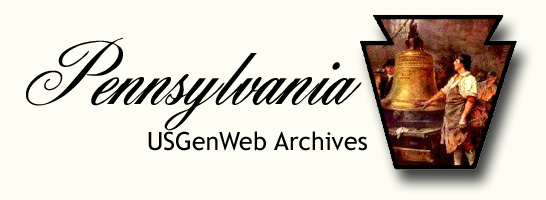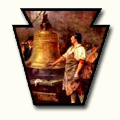|
A History of Pittsburg and Western Pennsylvania Troops in the War
By John V. Hanlon (Copyright 1919 by The Pittsburg Press)
Chapter VIII
(The Pittsburg Press, Sunday, Feb. 23, 1919, pages 66-67)
Names in this chapter: Barker, Floto, Crouse, Schell, Truxel, Hayman,
Friedberg, Fox, Smith, Vail
A few of the gallant sons of Pittsburg and Western Pennsylvania who went into
that inferno of fighting north of the Marne with the Twenty-Eighth Division,
which advanced so rapidly, despite desperate enemy resistance, that the crown
prince had difficulty in getting his armies and war material out of the
Soissons-Rheims salient.
THOSE WERE TRYING DAYS FOR THE PITTSBURG AND WESTERN PENNSYLVANIA DOUBOYS WHILE
THE TWENTY-EIGHTH DIVISION WAS HOLDING THE ENEMY ALONG THE VESLE, IN FRON OF
FISMES. THEY WERE OBLIGED TO LIVE IN CAVES AND HOLES DURING THE DAYTIME TO
ESCAPE THE CONUAL HAIL OF SHELLS. THEN CAME THE ORDER TO TAKE FISMES. THE
CAPTURE OF THIS TOWN WAS A STRENUOUS UNDERTAKING, BUT OUR MEN PERFORMED IT
UNFLINCHINGLY AND WHEN THEY HAD GAINED A FOOTHOLD, HELD ON. AFTER FISMES WAS
FISMETTE, AND OUR TROOPS SUFFERED HEAVILY IN ADVANCING ACROSS THE RIVER IN THE
INITIAL ASSAULT.
While the Twenty-eighth division was holding the enemy
along the Vesle, in front of Fismes, and awaiting for the order to cross the
river and start the Hun on another backward movement it was decided to clean up
an enemy position that was thrust out beyond his general line. A battalion of
the One Hundred and Tenth infantry was selected to do this work
With the One Hundred and Tenth was the Rev. Mandeville
J. Barker, of Uniontown, an Episcopal clergyman. Rev. Barker had won a place in
the hearts of the boys by his sturdy Americanism, buoyant and gallant
cheerfulness and his indifference to hardship or danger. His tender attention
for the wounded had also helped win for him the distinction of being the most
beloved man in the unit.

GOES OVER THE TOP WITH BOYS
The night the battalion attacked he went over the top,
and although it was not his duty to do, and he would probably have been
prevented had the higher officers known of his intention, nevertheless he
believed he would be needed to assist with the wounded. The Hun machine gun nest
was wiped out after a sharp attack and our men then retired to their own lines,
as ordered. It was a pitch dark night and as a result some of our wounded were
overlooked. Later the voices of the men who had been left behind on the
battlefield could be heard out in No Man’s Land calling for help.
It was then that Rev. Barker performed one of his many
acts of heroism, for, taking some water and first aid equipment, he slipped out
into the darkness, and with only the voices to guide him, he sought out the
wounded lying between the two armies. He attended to the men’s wounds as best he
could with the aid of a small pocket flash light which he had to carefully
conceal from the enemy lookouts or there would have been short shrift for the
wounded and likewise himself.
One after another of the wounded the clergyman hunted
out and did what he could to alleviate their sufferings. Those who could walk he
started back towards their own lines. Some he assisted, while others there were
who went out into the Great Beyond while he was ministering to their bodies and
their souls.
When he could hear no more voices and thought his work
of mercy completed for the night he started for the regimental lines, when
suddenly he heard some words in guttural German and the man was evidently
pleading for help. Rev. Barker turned right around and started back groping in
the dark for the sobbing man. He didn’t know but what it might be another of the
fiendish tricks of the Hun to trap Americans, neither did he care. All he could
hear was the stern call of duty. There was a stranger out on the “Jericho road’
wounded and bleeding and requiring care.
MINISTERED TO GERMAN BOY
He found a fair-haired German youth wounded so sorely
that he could not walk, and he was in mortal terror, not of death, but of those
“heartless Americans who torture their prisoners.” Like many other Germans, this
one had been taught to loathe the Americans and had been well primed with
harrowing stories of the cruelty of the men from the western world. The
clergyman treated the wounds of the German and then carried him back to the
American lines, although it required considerable explanation to convince the
German that he would not be put to some form of lingering agony. When he was
convinced he kissed Rev. Barker’s hand and insisted on turning over to him
everything he would remove from his person, including pistol, helmet, bayonet,
cartridges and other odds and ends.
An American sergeant, later describing the incident,
said the “parson was all hung over with loot.”
“The fighting parson” the boys called Rev. Barker,
although he did not fight. However, he came very close to the line at times, and
one incident is related where snipers were bothering the men of the Tenth, when
the clergyman grabbed up a pair of field glasses, and after a careful survey,
located four Germans in a well-concealed position. They were responsible parties
and he gave the location to the artillery. Then the big snout of a gun swung
around slowly and barked a few times and the sniping from that direction was
silenced. Two days later the regiment went over and captured that section of the
German line and found what was left of the four snipers.
The Pittsburgers and Western Pennsylvanians practically
lived the lives of cave men during much of this period of waiting along the
Vesle. The line was on the hills on the near side of the river’s valley and
little shelter holed had been dug in the hillside. Along the little railroad
which separated our lines from those of the enemy holes had been dug in the
embankment, also, and at night, our men raced for these holes in an effort to
listen for signs of German activity on the other side. These holes were just
about big enough to allow a man to protect part of his body. They were no
protection against a one-pounder, but helped to ward off shrapnel fragments.

WAS TICKLISH WORK
It was ticklish and dangerous work, this race to the
railroad embankment every night, and it was a crawling operation with every
chance that if the enemy got to his side first and discovered the Americans were
not in position, our men would be shot as they wriggled through the cinders of
the railroad ditch towards the embankment.
The holes along the hillside on the heights were
somewhat more comfortable than those in the railroad embankment, for the boys
could crawl in them out of the weather and then with a blanket around them and
some straw for a bed they could enjoy some real luxury in the way of sleep.
But they were only rest holes. Our men crawled into
them as daylight approached, because that was the time when the German flyers
came over along our advanced lines and attempted to get information and hurl
bombs on our troops. It was only in some of the large caverns in that territory
where the men could move about at will day or night. Always in the day they kept
well hid and out of sight of those prying eyes in the air.
Most of the fighting took place along the railroad and
at night. There were numerous raids, some large, some small. They did everything
possible to annoy and worry the Germans and to keep them in fear of the
doughboys. The raiding parties would suddenly race out and rush over the
embankment and then on to the German dugouts. They would throw their hand
grenades into these dugouts and then race back to their own territory.

BAD DAY FOR DOUGHBOY
One night a private went to sleep in one of the holes
along the railroad embankment and did not hear the withdrawal in the morning. He
was in a sorry predicament, for to try and run would have meant certain death.
So he just wormed his way into the embankment until he was entirely covered and
he was very careful not to make any noise. And there he remained all day while
the sniping and bombing and artillery fire raged all around him.

John Freidberg, of Mount Pleasant, held a conversation
with one of the Germans on the other side of the railroad bank one night and
finally induced the Boche to come over to be made prisoner. He convinced the
fellow that the best bet for him was to come over the bank and thus get out of
the war and also acquire some square meals in the allies’ prison pens.
Frequently at night our men could hear the enemy
calling: “American, American”, and there is no doubt that many prisoners could
have been taken by merely inviting them to come over to our lines and assuring
them that they would not be murdered. It was risky work, however, attempting to
conduct these talks with the enemy, because the Hun was not to be trusted.
Occasionally one would make a dive for our lines, but the chances were that he
didn’t get through unless our men know [sic] he was coming. If they didn’t the
German was likely to be under a cross fire before he took many steps, for he
would be the target for our men, and also the nearest German officer, who was
sure to try to drop him.

An interesting story is told of how two of the men of
the One Hundred and Tenth were lost in a cave for 48 hours. It so happened that
Rev. Barker gave a movie entertainment in the mouth of this cavern and while the
festivities were under way the two soldiers saw the lights and thus found their
way out. They came blinking into the crowd, but they had not been missed and no
one in the audience was aware of their experience. However, one of the lads
asked for something to eat. Their interference with the performance was resented
until it was ascertained that they really had been lost for two days in the cave
and then there was a rush to provide them with food.

GERMAN MAJOR GETS LESSON
Other incidents are related of how the Germans who
crouched on the other side of the railroad bank at night were surprised to hear
the Americans speak to them in their own language. There were many
Pennsylvanians who could speak German fluently. During one of the days a little
group of ambulance men from the One Hundred and Eleventh were carrying back a
wounded German major, who was groaning and complaining. He cursed the Americans
roundly at nearly every step the stretcher bearers took, until finally Thomas G.
Fox, of Hummelstown, one of the bearers, translated the tirade.
Our men stood it for a while longer until the German
made some particularly offensive remark, with the result that the litter was
turned over and the irate officer deposited, not too gently, upon the ground. He
continued to curse for a while, but when he learned that it did him no good he
started to crawl back and the crawl relieved him of some of his insolence.
Fismes was held by the Hun in considerable force,
although he had moved his big guns across the Vesle, thus admitting that he did
not expect to hold the south bank of the river. However, the strength left in
the town indicated that there was to be the customary stubborn defense and that
every possible obstacle was to be placed in the way of the Pennsylvanians.
For two days our men kept to the woods and watched many
French and American batteries coming up and taking position. It seemed as if
they would never stop coming, for there was a large concentration of artillery
preparatory to that attack. It seemed as if an attempt was to be made to
literally sweep the country clean of the Boche with gas, high explosives and
shrapnel before the infantry should be send forward.
FIGHT WAY INTO FISMES
Some French and American forces had crossed the river
to the east and west of the town, and it was necessary that to straighten out
the line Fismes must be captured, the river forced at this point, and Fismette,
on the far side of the river, likewise removed from under enemy control.
Numerous feelers had been put out to ascertain the strength of the Germans in
Fismes and Saturday afternoon, Aug. 3, some of the men from the Rainbow division
had succeeded in getting into the southern part of the town, where they hold on
like grim death until the next afternoon. Then they were deluged with gas that
it was inadvisable to remain.
It was information they were after and they were
successful to such extent that the material they furnished the general staff did
much to assist in formulating the plan of attack.
It was only a few hours after the return of these men
of the Rainbow division to their lines that the massed French and American
batteries turned loose a terrific hail of shells upon the enemy in Fismes. The
fire was so intense that the German fire, which had been going on in spurts,
since daylight, was stopped completely. The entire county back of the enemy
lines for miles was raked with every sort of death-dealing shell and there was
nothing for Fritz to do but seek cover.
The Pennsylvanians had been brought right up in front
for this attack and it fell to the lot of the One Hundred and Twelfth to lead
the advance. After about an hour of artillery preparation the rolling barrage of
shrapnel and gas was started and the One Hundred and Twelfth moved forward,
supported by the other regiments. The regiment raced for the southern edge of
the town, and although harassed somewhat by machine gun fire, the boys never
hesitated.

GERMANS SACRIFICED TO HOLD TOWN
Reaching to town there was another session of street
and house fighting. Scouts were sent forward to creep from corner to corner and
work their way by any possibly means. They hid behind any object that offered
the slightest protection until they saw a chance to proceed further. The streets
were swept by machine gun fire, either our own or the Germans, and frequently
some of our men and a squad of Germans would be in the same house and firing out
of different windows. The progress was slow and it was soon evident to our men
that the Germans were showing no disposition to retreat across the river.
And later it became apparent that they were left behind
as a sacrifice in order to delay the American advance. They had been ordered to
die in their tracks rather than move, and thus they fought with all the
stubbornness of wild animals cornered. It was a question of selling their lives
as dearly as possible. They had no hope. This was not the first time the German
command had left men in such a predicament. Most of them carried our orders and
died, but a few threw down their rifles and squealed “kamerad” when convinced
that their activities for the Kaiser were over. Officers and some wounded men
forced their way into a house and there found two unwounded Americans who had
preceded them. After making the wounded as comfortable as possibly the two
officers and an unwounded man started out to explore the house and neighborhood.
They crept out into a sort of walled garden, and, taking a peep through, they
looked straight into the eyes of two Germans. One had a machine gun in his hand
and the other had a grenade in each hand. Our boys called the grenades the
Germans use “potato mashers”, for they are fitted with sticks for handles. On
the end is the explosive container, which looks very much like a tomato can.
GRENADIER MEETS SUDDEN END
Both parties were startled and both paused to stare.
Then the German with the grenades started to swing them, just like Indian clubs,
but before he could let go two shots rang out and he sank slowly to the ground,
still clutching his grenades and with a pair of bullets in his body. The other
German beat a hasty retreat and ran yelling out into the street, where he became
the target for some of our men. He didn’t go far before he crumpled up in a heap
in the road.
It was thus that our boys took Fismes, and although
this sort of fighting is usually costly, nevertheless they rapidly cleaned out
every Boche in the town and wiped out the last foothold of the enemy in the
Soissons-Rheims salient.
When the enemy on the other side of the river was
certain that the Americans were in full possession of the town a hail of gas,
shrapnel and high explosives was turned loose from the heights where he had
planted much light artillery. The Germans from their positions were able to
observe all the American movements in Fismes and the surrounding territory.
Northward along the Aisne, where the Hun expected to make another stand, the
heavy artillery had been placed in position, and as this was only about five
miles away, our lines were well within range. The French and American batteries
answered and night and day the duel raged as our gunners attempted to search out
and silence enemy batteries. The firing became so violent Aug. 5 that
observation was impossible for our forces, and maps had to be used in the
attempt to destroy the Hun guns. The Germans were in much better position to
inflict damage, for they had just been driven out of the country now occupied by
our troops and therefore were perfectly familiar with the terrain.
They deluged every place within our lines with shells
of all sorts and sizes, and the crushing blows of the four and six-inch shells
were especially severe. The Pennsylvanians held on like grim death and when the
town was safely in their possession plans were formulated for the taking of
Fismette, just across the river.
MANY DIE AT FISMETTE
Fismette will long be remembered as one of the
bloodiest spots in all the great war, and in the taking of the town many a
Pittsburger and Western Pennsylvanian went to his death. The Germans, although
not expecting to make any serious stand short of the Chemin-des-Dames, had
evidently been unable to move their army and vast quantity of war supplies
northward fast enough to keep away from the unrelenting Yankees, who were ever
at their heels and threatening to break through their rear guards. Thus the
enemy was forces, in order to save himself, to attempt a check on our advance at
Fismette and here was concentrated a major effort. The town was bristling with
machine guns well supported by artillery and defended by fresh troops, the
flower of the kaiser’s soldiery, for the Prussian guard was there.
The plans for the assault called for units of the One Hundred and Eighth Machine
Gun battalion to cross the river and attempt to establish a bridgehead on the
north side. Maj. Robert M. Vail, of Scranton, in command, sent over two
companies and they waded the river in a terrific hurricane of bullets. The water
was up to their armpits and they were forced to hold their rifles, cartridges
and other material which might be damaged by the water, above their heads. The
Germans took heavy toll of the two companies during this crossing, but
sufficient of the boys gained the opposite bank to put up a demon-like scrap
while waiting for reinforcement.
As the machine gunners waded, the One Hundred and Third
Engineer regiment was sent down to the river to throw bridged across the stream,
the engineers were also subjected to a death-dealing fire of machine guns and
shrapnel, but they never wavered and kept at their tasks. In addition to the
steel showered upon them some gas shells were mixed in, thus forcing them to
undergo the added discomfort of wearing masks.
GLORIOUS BRAVERY SHOWN
It was indeed a spectacle to see those engineers
working out in the open with comrades dropping on every hand, and expecting
every minute to go down themselves. It was one of the grandest examples of
bravery ever recorded in the history of the American arms. The boys worked like
Trojans and when one would go down another would take his place. They had been
told to get those bridges over the river and they proposed to do it, even until
the last man should fall. It is a wonder that any of them escaped the hate which
Fritz, from his vantage points on the other side of the river poured upon that
Spartan band. Out in the water they worked with the shells churning up geysers
all around them and when a man was hit the chances were that even in only
wounded he would be carried away by the current and drowned.
When the first bridge was almost completed the
engineers suffered the disappointment of seeing it split into a mass of
splinters in the twinkling of an eye, for a big shell made a direct hit. Such an
occurrence would have discouraged many men. But not so those Pennsylvania
engineers. They would build those bridges across the river if it took until the
crack-o-doom. They calmly set about to rebuild the structure which had already
cost so many lives.
GREAT KEYSTONE DIVISION FIGHTS
It was slow work to bridge the stream and frequently
another shell would come and destroy parts of the work, so that the men had to
do it all over again. Time and time again this happened. Before the bridges were
completed officers decided to make an attempt to get infantry across the ford,
as the machine gunners had been successful in their wading operations and needed
support on the other side. Several detachments were sent over through the water
and when the bridges were competed the process of getting troops on the other
side was hastened considerably, although shells continued to hit them
occasionally in places, necessitating almost constant repair by the engineers.
Those who got across the ford or the bridges met a
stone wall of resistance, for the enemy was fighting under orders to hold
Fismette at all costs. The Germans made every possible effort to drive the
Pennsylvanians back across the river, but attack after attack was met with a
stubbornness which, each time, caused the Hun to fall back in dismay. The French
and American artillery support on the heights south of the Vesle did much to
assist our men in warding off these counter-attacks and they also had the
satisfaction of knowing that their own artillery was in action at last and
lending its aid to their efforts.
Pennsylvania was now in the fight with a complete
division, and such a division. Those doughboys proved themselves the peers of
any fighting men the world has ever known.


|












